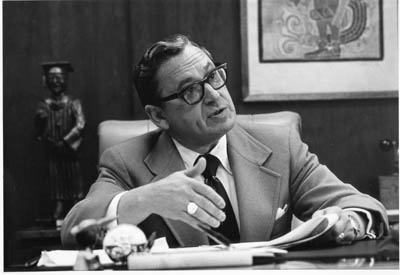
Half-Centennial Retrospective
By Daniel Gross

Dean Abe Gitlow circa 1977 |
Abraham (Abe) Gitlow joined NYU Stern when it was, in his words, an academic “factory,” focused on giving thousands of New York City residents the skills necessary to assume important roles in the emerging US post-WWII workplace. When he retired 40 years later, Stern had grown into a highly diversified institution with an international reputation for excellence in academic research and teaching.
An Air Force veteran and Columbia PhD, Gitlow joined the School of Commerce, Accounts & Finance (as NYU Stern’s Undergraduate College was then known) in 1947.
“It was a huge, educational factory – and I don’t mean that in a pejorative way,” said Gitlow, who served as dean of the School of Commerce from 1965 to 1985. With student ranks swelled by former GIs, “there were about 10,000 students registered. The graduating classes dominated the Commencement exercises of the University.”
The offices, then in Shimkin Hall, were similarly packed. Faculty members shared desks.
“There were completely open department offices we referred to as bullpens,” herecalled.
At the time, the School of Commerce was divided roughly equally between day and evening students. The classes were large and practical. Many members of the faculty did not have doctorates, and they focused more on teaching the application of business than on conducting academic research. “It was a true school ofopportunity,” he said. “And a very large number of the city’saccountants, attorneys, and businesspeople in all spheres of industry graduatedfrom that School.”
But over time, as demographics shifted, the School’s mission and ambitionchanged. With that change, new resources were attracted. Gitlow was named deanin 1965. Over the next two decades, the School’s academic reputation grew – “withprofessors like Ernie Kurnow, Mike Schiff (PhD ’47), Bob Kavesh (BS ’49),and Jules Backman (BS ’31, MBA ’33, PhD ’35), the School beganto make what became an extraordinary transformation,” Gitlow said.
The School acquired more real estate, backed by a large gift from the Tisch family. Working with famed architect Philip Johnson, who designed Tisch Hall, was one of the highlights of Gitlow’s tenure. “Johnson told [former New YorkUniversity President] Jim Hester that it was a pleasure to do business with usbecause we knew what we wanted, and consequently he had a very clear mandate,” hesaid.
Over time, the Stern School acquired a more global outlook and a larger and deservedly earned reputation for attracting students from all over the world, and equipping them with the tools needed to become leaders in today’s global economy. “Ifyou tell someone that you're an alumnus of Stern, there’s a little archingof the eyebrow, a kind of nod, and a great deal of respect,” Gitlow remarked.
At 87, Gitlow is retired, but hardly retiring. In 1995, he wrote the Stern history, NYU’s Stern School of Business: A Centennial Retrospective. And last year,Gitlow, who lives in Miami Beach, published Corruption in Corporate America:Who is Responsible? Who Will Protect the Public Interest? (University Press ofAmerica). As he looks up north, he likes what he sees. “The UndergraduateCollege today is a place for smart, ambitious kids who are going to be the creatorsof a greater society,” he concluded.
Daniel Gross is editor of Sternbusiness.


![]()